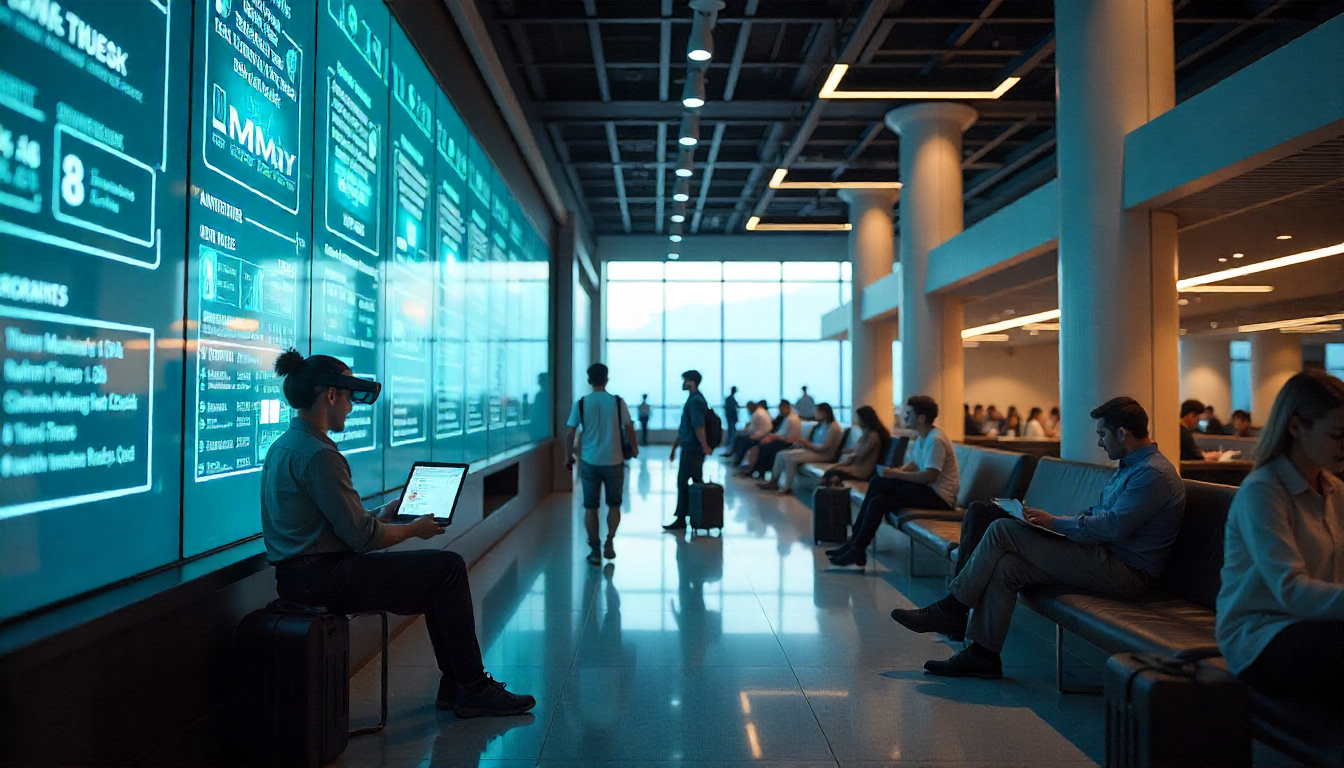Travel Industry Trends 2025: Customer Experience Revolution

Travel Industry Trends 2025: Customer Experience Revolution
Travel predictions for 2025 show customer experience driving industry transformation. Modern travelers demand personalized, tech-enabled journeys that blend convenience with sustainability. With 74% of travelers planning domestic trips and 50% planning international travel, the industry faces unprecedented opportunities to reimagine customer service delivery.
Table Of Content
Current State of Travel Customer Experience
Technology reshapes what customers expect from travel companies. Travelers want seamless digital experiences from booking to boarding.
Approximately 40% of travelers worldwide now use AI-based tools for trip planning, marking a significant shift toward automated assistance. This demand extends to:
- Real-time journey guidance through AR-enhanced mobile apps
- IoT-powered hotel personalization before, during, and after stays
- Contactless payment systems and biometric authentication
- Transparent booking processes using blockchain technology
Travel companies that fail to meet these digital expectations lose customers to competitors who embrace innovation. The rise of niche markets like sustainable travel, wellness tourism, and remote work creates new differentiation opportunities.
Tip
To enhance your eCommerce store’s performance with Magento, focus on optimizing site speed by utilizing Emmo themes and extensions. These tools are designed for efficiency, ensuring your website loads quickly and provides a smooth user experience. Start leveraging Emmo's powerful solutions today to boost customer satisfaction and drive sales!
Top 7 Travel Trends Shaping 2025
1. AI-Powered Travel Personalization Takes Center Stage
Travelers pay up to 67% more for personalized experiences, making customization essential for revenue growth. AI analyzes customer data to create tailored itineraries based on past behavior, preferences, and real-time feedback.
Personalized offers increase customer satisfaction by about 20%, according to recent research. This technology transforms how companies engage with travelers throughout their journey.
Key personalization features include:
- Dynamic pricing based on customer profile
- Customized destination recommendations
- Adaptive booking interfaces
- Predictive service delivery
| Personalization Type | Customer Impact | Revenue Increase |
|---|---|---|
| AI Itinerary Planning | +35% satisfaction | +25% bookings |
| Dynamic Pricing | +20% conversion | +18% revenue |
| Customized Recommendations | +40% engagement | +30% upsells |
2. Contactless Technology Becomes Standard
Digital services eliminate friction points across the travel experience. Mobile check-in, digital boarding passes, and contactless payments reduce waiting times while improving operational efficiency.
Generation Z travelers drive this contactless revolution. They expect seamless digital interactions at every touchpoint, from hotel entry to restaurant payments.
Essential contactless features:
- Mobile room keys and boarding passes
- Biometric passport authentication
- Digital concierge services
- Integrated payment systems
3. Sustainable Travel Gains Market Momentum
Environmental consciousness influences travel decisions more than ever. Three-quarters of travelers prioritize sustainable options when planning trips.
Travel providers investing in eco-friendly infrastructure capture growing market segments. This includes:
- Carbon-neutral transportation options
- Sustainable accommodation certifications
- Environmental impact filtering in booking systems
- Local community support programs
4. Immersive AR/VR Experiences Drive Bookings
Travelers seek alternatives to overcrowded destinations, making virtual previews crucial for decision-making. AR and VR technology allows customers to explore destinations before booking.
These immersive experiences include:
- 360-degree hotel room tours
- Virtual destination walkthroughs
- Interactive attraction previews
- AR navigation at tourist sites
Virtual reality reduces booking uncertainty while increasing customer confidence in their choices.
5. Remote Work Fuels 'Workcation' Market Growth
41% of travelers plan workcations in 2025, creating a billion-dollar market opportunity. The blend of business and leisure travel requires specific infrastructure and services.
Workcation essentials travelers demand:
- High-speed internet connectivity
- Dedicated workspace areas
- Co-working space partnerships
- Extended-stay pricing options
| Workcation Feature | Importance Rating | Market Demand |
|---|---|---|
| Reliable WiFi | 95% | Critical |
| Quiet Workspace | 87% | High |
| Professional Printing | 62% | Moderate |
| Video Conference Facilities | 78% | High |
6. Health Integration Becomes Travel Standard
Digital health certificates proven during the pandemic now extend beyond COVID requirements. Travelers expect health-focused features integrated into travel apps.
Modern health integration includes:
- Vaccination requirement tracking
- Destination-specific medical alerts
- Real-time health monitoring
- Predictive health risk assessments
Business travelers benefit most from these features, especially those visiting multiple countries with varying health requirements.
7. Adventure and Off-Beat Travel Experiences Surge
63% of travelers want off-the-beaten-track destinations for their next trip. This shift away from mainstream tourism creates opportunities for niche travel providers.
AI platforms match adventurous travelers with unique local experiences. Real-time translation and cultural guides remove traditional barriers to exploration.
Popular adventure travel elements:
- Cultural immersion experiences
- Local tradition workshops
- Hidden destination discoveries
- Authentic community interactions
Technology Investment Priorities for Travel Companies
The AI travel market grows from $131.7 billion in 2024 to $2,903.7 billion by 2033, while travel technology overall reaches $18.6 billion by 2033. Companies must prioritize strategic technology investments.
Essential Technology Stack for 2025:
| Technology Category | Investment Priority | ROI Timeline |
|---|---|---|
| AI Personalization | High | 6-12 months |
| Contactless Systems | Critical | 3-6 months |
| AR/VR Integration | Medium | 12-18 months |
| Sustainability Tracking | High | 6-12 months |
1. Implementation Strategy for Travel Businesses
Companies succeeding in 2025 focus on integrated customer experience rather than isolated technology deployments. The key is aligning technology with customer needs instead of adopting tools in silos.
Successful businesses leverage connected systems, real-time adaptation, and sustainability to build trust and long-term loyalty in the travel industry.
Core implementation strategies include:
- Data Integration – Connect customer touchpoints across all platforms
- Mobile-First Design – Prioritize smartphone user experience
- Real-Time Adaptation – Adjust services based on live customer feedback
- Sustainability Reporting – Provide transparent environmental impact data
Conclusion
International visits to destinations grow 8.8% in 2025, driven by pent-up travel demand and improved digital experiences. Companies investing in customer experience technology capture disproportionate market share.
The travel industry transforms from transaction-based to relationship-driven business models. Success depends on understanding individual customer needs and delivering personalized solutions at scale.
Travel predictions for 2025 point toward an industry where technology amplifies human connection rather than replacing it. Companies balancing digital innovation with authentic experiences win customer loyalty in this evolving market.
FAQs
What are the top travel industry trends for 2025?
Key trends include AI-driven personalization, seamless digital booking systems, sustainable travel practices, and real-time service adaptation to customer needs.
How will customer experience shape the travel industry in 2025?
Customer experience will be the main competitive factor, with businesses focusing on personalized journeys, mobile-first design, and transparent communication at every stage of travel.
What role will AI play in the travel sector by 2025?
AI will power predictive booking tools, automated itinerary planning, personalized recommendations, and smarter customer service through chatbots and virtual assistants.
Why is mobile-first design essential for travel businesses in 2025?
Most travelers book, modify, and manage trips via smartphones, making mobile-first design critical for delivering smooth, responsive, and engaging digital experiences.
How will sustainability influence travel in 2025?
Sustainability will be a key decision factor for travelers, with companies required to offer eco-friendly options, track carbon footprints, and report environmental impact transparently.
What technologies will transform the travel experience in 2025?
AR/VR for immersive trip previews, contactless systems, blockchain for secure payments, and advanced data integration platforms will reshape how travelers engage with brands.
How will real-time adaptation benefit travelers?
Real-time adaptation enables businesses to respond instantly to feedback, weather changes, or travel disruptions, ensuring travelers enjoy smoother and more flexible journeys.
What financial impact will these trends have on travel companies?
Businesses embracing digital transformation can expect higher customer retention, increased revenue from personalized upselling, and significant operational cost savings.
Which travel businesses will lead in 2025?
Companies that integrate data-driven personalization, sustainable practices, and seamless mobile experiences will emerge as leaders in the competitive travel market.
What is the overall outlook for the travel industry in 2025?
The travel industry is set for a customer experience revolution, with digital-first strategies, sustainability, and personalization driving growth and shaping the future of tourism.









